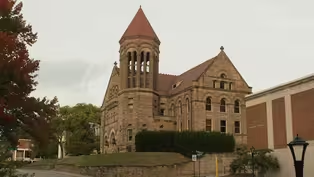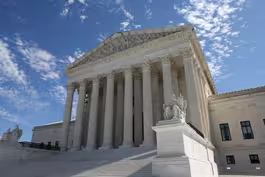
Maine gunman's family flagged behavior before shooting
Clip: 10/31/2023 | 6m 48sVideo has Closed Captions
Police scrutinized after revelations Maine shooter's family flagged his behavior
Lewiston, Maine, is in mourning after last week’s shooting that killed 18 people. Along with the grief, there’s growing scrutiny about why law enforcement didn't find or stop Robert Card before the shooting. Friends, family and the Army Reserve all reported concerns about his behavior and access to guns months before the shooting. Laura Barrón-López discussed more with Margaret Groban.
Problems playing video? | Closed Captioning Feedback
Problems playing video? | Closed Captioning Feedback
Major corporate funding for the PBS News Hour is provided by BDO, BNSF, Consumer Cellular, American Cruise Lines, and Raymond James. Funding for the PBS NewsHour Weekend is provided by...

Maine gunman's family flagged behavior before shooting
Clip: 10/31/2023 | 6m 48sVideo has Closed Captions
Lewiston, Maine, is in mourning after last week’s shooting that killed 18 people. Along with the grief, there’s growing scrutiny about why law enforcement didn't find or stop Robert Card before the shooting. Friends, family and the Army Reserve all reported concerns about his behavior and access to guns months before the shooting. Laura Barrón-López discussed more with Margaret Groban.
Problems playing video? | Closed Captioning Feedback
How to Watch PBS News Hour
PBS News Hour is available to stream on pbs.org and the free PBS App, available on iPhone, Apple TV, Android TV, Android smartphones, Amazon Fire TV, Amazon Fire Tablet, Roku, Samsung Smart TV, and Vizio.
Providing Support for PBS.org
Learn Moreabout PBS online sponsorshipGEOFF BENNETT: Lewiston, Maine is in mourning after last week's shooting that killed 18 people and injured 13 others.
It's the worst mass shooting in the state's history, and questions remain over why it wasn't prevented, despite warning signs.
Laura Barron-Lopez has the latest.
LAURA BARRON-LOPEZ: Geoff, Mainers are still feeling this loss.
Joshua Seal was one of four members of the deaf community killed.
He leaves behind four children and his wife, Elizabeth, who is also deaf and speaks here through an interpreter.
ELIZABETH SEAL, Widow of Shooting Victim (through interpreter): I want the world to remember him, his passion, his love, his patience, his kindness, his motivation, his zeal for life, his ability to get things done, and his humor.
LAURA BARRON-LOPEZ: Along with the grief, there's growing scrutiny about why law enforcement didn't find or stop Robert Card before the shooting.
His friends and family and the Army Reserve all reported concerns about his behavior and access to guns to police months before the shooting, according to documents released by the Sagadahoc County Sheriff's Office.
We have now learned that, in May, Card's family told police he was experiencing paranoia and hearing voices.
They also reported he had 10 to 15 firearms.
In July, Card's Army Reserve unit sent him to a psychiatric hospital for two weeks.
In early September, Card told a friend he was going to commit a mass shooting.
Then, on September 15, deputies went to Card's home, but didn't find him.
They sent an alert to other law enforcement agencies stating he was -- quote -- "armed and dangerous."
On September 16, police returned to Card's home, found his car, and reported hearing someone inside who would not answer the door.
On October 18, just one week before the attack, police canceled the alert.
For a closer look at this, I'm joined by Margaret Groban, a retired federal prosecutor and law professor at University of Maine School of Law.
Margaret, thank you so much for joining.
Can you recall a shooting like this, where multiple active warnings right before the shooting occurs and they go nowhere?
MARGARET GROBAN, University of Maine School of Law: Well, I think you have to kind of look at it in context.
Looking at it in hindsight, which is 20/20, it looks like all these dots have been connected.
But I doubt that those dots were all connected ahead of time.
And so -- and the law enforcement was really limited in what they could do in this situation.
Although it's a tragic situation, I think the mental health crisis and the access to firearms, especially an assault weapon, is what led to the tragedy here.
LAURA BARRON-LOPEZ: So are you saying that, essentially, at the time that all of these warnings were occurring that, potentially, police and the Army Reserve and others were just not communicating with each other?
MARGARET GROBAN: No, I can't speak to that.
I don't know what was happening within that law enforcement community, because I'm not a part of that.
But I know that the laws that were available to them to try and stop this kind of shooting from happening are extremely burdensome and would have been very difficult to use in this situation.
LAURA BARRON-LOPEZ: And so law enforcement appeared to try to find Robert Card prior to the mass shooting, but didn't.
And then they dropped their alert on him.
Is that a breakdown of procedures under Maine's yellow flag law?
MARGARET GROBAN: Well, under Maine's yellow flag law -- I'm glad you raised that -- the person has to be taken into protective custody in order for the procedure to start to then get a mental health assessment and then go to the judge, unlike in states, many states, that have red flag laws, where the family could bond directly to the court and asked for an intervention or relinquishment of the firearm.
So, they didn't find Mr. Card, so they couldn't take him into protective custody and get the procedure started.
So I think a procedure that didn't require those steps would be beneficial for our state going forward.
LAURA BARRON-LOPEZ: Would you say then that the law enforcement officers couldn't have done much more than they already did?
MARGARET GROBAN: Well, I don't know those circumstances, so I don't feel right commenting on them, but I know that, absent taking him into protective custody, and when they went to the house and he did not respond, what were their options?
To get a warrant for his arrest?
What options did they have going forward?
But the family could not on their own have gone to the court and asked for relinquishment of firearms.
That much, we do know.
LAURA BARRON-LOPEZ: If Maine had a red flag law in place, what could have happened differently?
MARGARET GROBAN: What could have happened is that the family, who expressed concern -- it looks like a brother, a sister, an ex-wife and a son all expressed concern about Mr. Card.
And they could have gone directly to a court, given their evidence that they had that he might pose a danger to himself of others, and asked for an order to relinquish his firearms.
Or they could have gone and tried to get Mr. Card involuntarily committed to a psychiatric hospital.
So those could have been two avenues that they could have pursued.
LAURA BARRON-LOPEZ: Based on the information that we have so far -- and we know that more is likely to probably come out.
But, beyond a red flag law, do you think that there's anything else that Maine could change about its gun laws that could prevent a situation like this in the future?
MARGARET GROBAN: I certainly do.
And I know that everyone is looking at these specific facts and you want to target, did this person act correctly?
Did this person act correctly?
But the bottom line is that this was someone in a mental health crisis who had access to assault weapons.
Absent the assault weapon, there would not have been a mass shooting.
We do not have an assault weapon ban in Maine, and it was easy for him to obtain those weapons.
LAURA BARRON-LOPEZ: Professor, you mentioned that these laws can be quite burdensome.
Could you expand on that a little bit?
MARGARET GROBAN: Yes.
In order to get the yellow flag laws, I said first law enforcement must be called.
They must take a person into protective custody, which means putting them in the back of a patrol car, which can be an extremely difficult and dangerous situation for law enforcement.
Then they have to get a mental health assessment which shows that person is a danger to themselves or others.
And then they have to go to the court to get the court to determine whether or not that person is a danger to themselves or others.
So, it's a three-step process, while, in red flag states, all you have is a one-step process, where judges determine dangerousness every day of the week.
When they set bail, when they sent in someone, they make those determinations.
And Maine has instead imposed two additional steps that I think are not in the best interests of our state.
LAURA BARRON-LOPEZ: Professor Margaret Groban of the University of Maine, thank you so much for your time.
MARGARET GROBAN: Thank you.
Alabama jail accused of mistreating pregnant detainees
Video has Closed Captions
Clip: 10/31/2023 | 6m 8s | Alabama jail accused of mistreating pregnant detainees, putting unborn children at risk (6m 8s)
Israeli airstrike hits refugee camp in northern Gaza
Video has Closed Captions
Clip: 10/31/2023 | 11m 56s | Israeli airstrike hits refugee camp in northern Gaza, killing and wounding civilians (11m 56s)
Students protest WVU cuts targeting academic programs, jobs
Video has Closed Captions
Clip: 10/31/2023 | 9m 11s | Students protest West Virginia Univ. budget cuts targeting academic programs and jobs (9m 11s)
Supreme Court takes on officials blocking online followers
Video has Closed Captions
Clip: 10/31/2023 | 6m 1s | Supreme Court takes on cases involving public officials blocking social media followers (6m 1s)
Viet Thanh Nguyen's memoir reflects on experience of war
Video has Closed Captions
Clip: 10/31/2023 | 7m 38s | Author Viet Thanh Nguyen's new memoir reflects on family's experience of war and exile (7m 38s)
Providing Support for PBS.org
Learn Moreabout PBS online sponsorshipSupport for PBS provided by:
Major corporate funding for the PBS News Hour is provided by BDO, BNSF, Consumer Cellular, American Cruise Lines, and Raymond James. Funding for the PBS NewsHour Weekend is provided by...
















